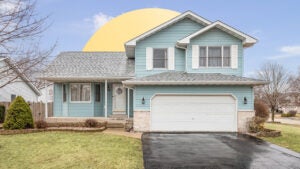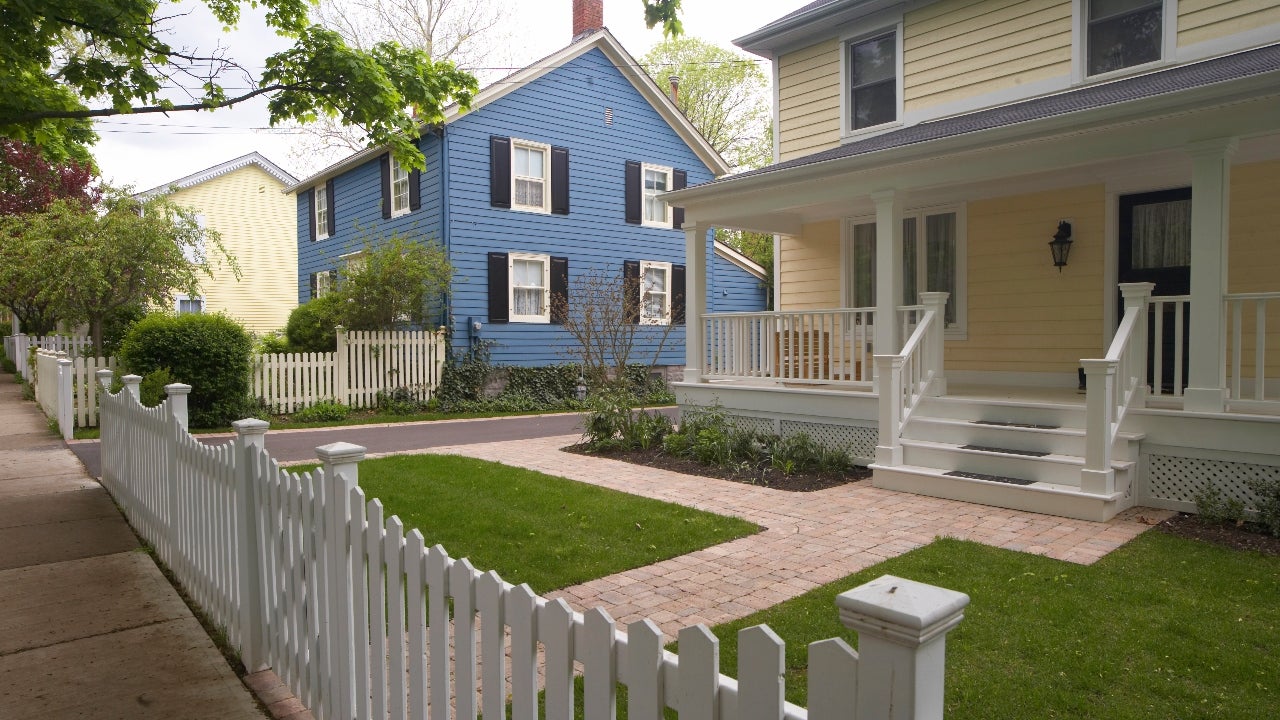What is a chattel mortgage?

Key takeaways
- A chattel loan is a loan used to buy movable property — including manufactured homes.
- You can get a chattel loan from a lender to purchase a manufactured home, but you’ll need to figure out how to buy or rent the land to put it on separately.
- These manufactured home loans often come with looser borrower requirements but higher interest rates than traditional mortgages.
What is a chattel mortgage?
A chattel mortgage is a loan used to buy movable property, like manufactured and mobile homes, rather than fixed real estate. They are sometimes referred to interchangeably as manufactured home loans.
“Traditional mortgages are used to buy ‘real’ property — for example, a house and the land that it sits on,” says Sebastian Frey, a Realtor in the Silicon Valley area. “Chattel mortgages are only used to buy ‘personal’ property: property with no land attached.”
So, if you need to finance both the property and the land, you’ll need to explore a traditional mortgage or pursue a separate loan for the land.
While chattel mortgages are primarily used to purchase manufactured homes, they can also be used to buy things like heavy machinery and vehicles. As a result, equipment loans qualify as chattel mortgages, too.
How a chattel mortgage works
You can use a chattel mortgage to buy movable property that will collateralize the loan, like:
- A manufactured home
- A houseboat
- A vehicle
- An RV
- A plane
- A piece of heavy machinery
“On the business side, chattel mortgages are frequently used for financing commercial equipment, such as agricultural machinery or construction vehicles,” Sandeep Sood, a former vice president of Capital One and founder and CEO of fintech consultancy Kunai.
The key thing here — and what makes the loan a mortgage — is that whatever you’re buying serves as collateral for the loan. In other words, the lender can take that collateral if you stop repaying your chattel mortgage.
There are a few ways that a chattel loan functions differently from a traditional mortgage:
- Bigger down payment requirement: “Chattel mortgages are deemed to be at a higher risk for loss, so the down payment requirements are typically higher than for a conventional mortgage,” Frey says. He says chattel loans usually require at least 20 percent down, and 30 percent down or more isn’t uncommon.
- Higher interest rates: Chattel loans often come with higher interest rates. “As of February 2025, the average 30-year fixed-rate mortgage sits around 6.76 percent, while a chattel loan for a manufactured home, as an example, often has rates of 8 percent or higher,” Sood says.
- Shorter repayment term: “The loans must often be repaid within 20 years — versus 30 with a conventional mortgage,” Frey says. Some chattel loans have even shorter terms, like five or 10 years.
- Lower loan amount: Usually, the maximum amount on a chattel loan is lower compared to a traditional mortgage. That’s because lenders won’t extend more than the value of the property. Values of manufactured homes typically fall below those of traditional houses, and the loan amount isn’t backed by any land value, either.
- Lack of appreciation: “The property that can be bought with these loans typically do not appreciate in value,” Frey says, explaining that this is a big reason chattel loans are at a higher risk for loss. “If you’re getting a chattel mortgage, it might be better to think of what you’re buying as something that is truly an expense, versus a property that will pay a return on your investment over time.”
Key terms
The most complicated part of understanding a chattel loan is understanding what, exactly, lenders mean by chattel. For that, we can turn to the Merriam-Webster dictionary, which defines chattel as:
“An item of tangible movable or immovable property except real estate and things (such as buildings) connected with real property.”
In the world of mortgages and real estate, real property is land and anything permanently attached to it. A traditional home, then, is real property. But a mobile home that could be relocated counts as chattel.
Chattel mortgage requirements
Here are a few other requirements you’ll need to consider when pursuing a chattel loan:
- Loan terms: As noted above, with chattel loans for mobile homes, you’ll usually be required to put down a larger down payment (20 percent or more), repay the loan in a shorter term (like 20 years instead of 30) and pay a higher interest rate on the money you borrow.
- Personal finances: Lenders will often approve chattel loans for borrowers with lower credit scores, higher debt-to-income (DTI) ratios or other less favorable characteristics.
- Insurance: The lender might also require you to get insurance to protect the mobile home before they’ll give you a chattel loan for it.
- Documentation: In addition to proof of income and tax returns, the lender may ask for documentation that validates where the chattel will be stored. If you’re leasing a lot in a mobile home park, for example, they might ask for a copy of your lot lease agreement. They might even have specifications about which mobile home parks they’ll approve.
As with a traditional mortgage, the lender wants to know that they’re likely to get back the money they’re extending in the chattel loan. That means they want to make sure the collateral is worth enough to recoup their losses if you stop repaying.
For chattel loans for mobile homes, then, you usually need to get a valuation of the property. An appraiser from the lender might need to look at the mobile home, for example. “Chattel mortgages will be strict when it comes to the quality of the asset they are lending on,” Frey says. “Many chattel mortgages will not work for older homes, single-wide homes (‘trailers’) or homes that have had structural modifications.”
Chattel mortgage pros and cons

Pros
- Can be more affordable since you don’t need to finance the land
- More streamlined application and approval process with fewer fees
- Relaxed borrower requirements

Cons
- Higher interest rates
- Larger down payment requirement
- Little to no property appreciation
Getting a traditional mortgage is a rigorous process, but getting a chattel loan for a mobile home can be faster and easier, with fewer steps and more lenient thresholds when it comes to things like your credit score, income and DTI ratio. The chattel loan might also come with lower closing costs than a traditional mortgage.
However, because lenders view a chattel loan as higher risk than a traditional mortgage, they usually require more money down and charge a higher interest rate. You can’t expect to recoup that money through property appreciation, either, as mobile and manufactured homes don’t usually appreciate in value like traditional homes. And because you don’t own the land, any appreciation there doesn’t go into your pocket.
Alternatives to chattel mortgages
If you want to buy the land, too, you can explore a traditional mortgage. That includes federal home loans, like mortgages backed by the U.S. Department of Agriculture (USDA), the Department of Veterans Affairs (VA) and the Federal Housing Administration (FHA).
Both USDA loans and VA loans can be used for manufactured home loans, but you’ll need to buy the land on which the home sits, too.
You can get FHA loans for mobile homes through the Title I Manufactured Home Loan Program. This loan program allows you to finance a mobile home and lease rather than purchase the lot.
Alternatively, if you’re not interested in buying the land and you want a way to finance your movable property, you can look into a personal loan.
What homebuyers should know about chattel mortgages today
A chattel loan might be your best option if you’re looking to finance a mobile home but you don’t want to buy the land. When you’re buying a mobile home in a mobile home park where you’ll rent the land, Frey says, “These homes do not constitute ‘real’ property since they are not permanently affixed to the land, and the land is not sold along with the home. Chattel mortgages are tailor-made for buyers like these.”
Sood agrees, saying, “Chattel financing is best for individuals or businesses acquiring high-value, movable property that doesn’t involve land ownership. For consumers, this could include people purchasing manufactured homes without the land component, such as retirees in mobile home communities or buyers in land-lease developments.”
Be advised, though, that a chattel loan is not without its risks. A Consumer Financial Protection Bureau (CFPB) report points out that chattel loans for mobile homes offer fewer borrower protections than traditional mortgages. Make sure you have a plan to repay what you borrow for your movable property or the lender has grounds to seize it from you.
How to get a chattel mortgage
Each lender has its own process for accepting applications and approving chattel loans. Generally, though, you’ll need to provide some information about yourself — like proof of income — and some information about the property you want to buy.
Not all lenders offer chattel mortgages. But, per CFPB data, the top five biggest chattel loan lenders are:
- 21st Mortgage
- Vanderbilt Mortgage and Finance
- Triad Financial Services
- Credit Human Federal Credit Union
- Cascade Financial Services
Don’t move forward with the first chattel lender you encounter, though. Get quotes from at least three lenders to ensure you’re getting the best interest rate and terms on your chattel loan.
FAQs
Why we ask for feedback Your feedback helps us improve our content and services. It takes less than a minute to complete.
Your responses are anonymous and will only be used for improving our website.







